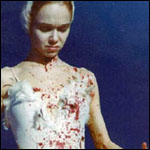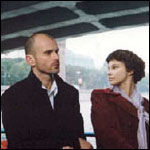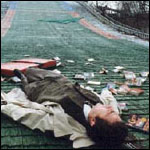“Moscow”. Dir. Alexander Zeldovich (2000)
The script “Moscow” by the well-known prose writer and conceptualist Vladimir Sorokin (written jointly with A. Zeldovich) explored the emergence of a new language of power, a discourse of the “new Russians” from the splinters of the Soviet monolith and from recollections about totalitarian culture.
According to the script this discourse of a new totalitarianism (that emerged, it seems, on the basis of free enterprise!) has literally been formed in front of our eyes, has absorbed the most colourful characters (Mike, Mark), and has opened the path for a non-entity that covers its facelessness with a multiplicity of faces (Lev).
It is no accident that this script has become one of the most striking literary events of the late 1990s; it offers not only a new view of contemporary Russian life, but also suggests a new style that is built on the combination of estrangement, pastiche, parody of dead cultural languages, cruel naturalism and a new monumentality, which has elevated its own idols on the symbolic ruins of the Stalinist high-rises.
It is amazing that, following the script by the word, Alexander Zeldovich has made a film about something completely different: about the tragic absence of cultural language, feelings, relationships (no matter whether business or personal).
This tragic dumbness is most sharply rendered through the music of the film, and in particular through the songs which Olga (T. Drubich) sings: recognisable Soviet songs, where something has shifted, slipped; the energetic, forceful, and heroic tunes that we know from childhood have turned into nervous and painful jazz tunes that contradict the old text.
Each of the heroes tries, in his own way, to come to terms with the wordlessness by filling the gruesome pauses with sex (always wordless), vulgar discourse, violence or eloquence from the impossibility to genuinely express anything at all. Moreover, there are no winners in this situation.
The final scene was viewed inthe script as the triumph of the new freedom, condemning all relative values; in the film this scene looks like a sign of existential defeat (the combination of things incompatible creates no new quality, no new freedom, but reveals instead emptiness and the essential incapacity to make a choice), because there are no criteria of choice, there is no language. From the pauses, from the obviously insignificant words, from the monologues pronounced nowhere and for no purpose, from the fantastically rich and complex dumb play of the actors, from the play with colours (at the beginning colourful kitsch, then right down to the cold emptiness, that seems to have been pierced by cold draughts): this is the material from which the film “Moscow” is made; a material that is amazingly transparent, delicate, and at the same time rigidly focused around the eternal philosophical issues of the epochal question of the dislocation of time, a question that the Russia of the 1990s is facing.
The combination of almost impressionistic lyricism with pitiless sobriety of the philosophical analysis of the present brings this film ‘about the new Russians’ paradoxically close to Chekhov’s plays. Incidentally, this proximity was anticipated in the script, where the central characters are called Irina, Olga, and Masha. However, in the script these names were one of the forms of parody or pastiche. In the film “Moscow” the parody has gone and made way for the Chekhovian mood, which has moved to the foreground without force and grimaces, but as the result of a natural inner dialogue.







